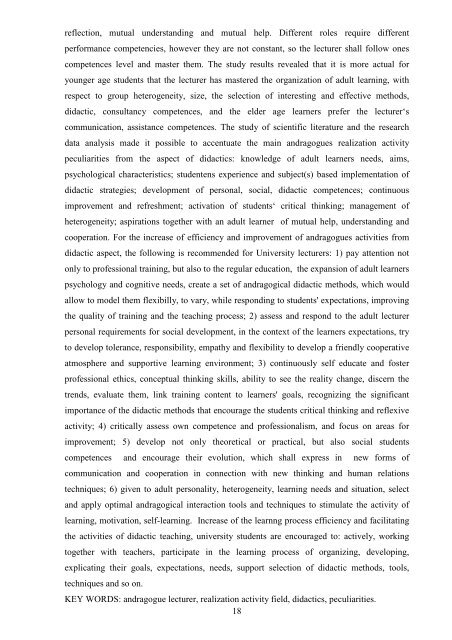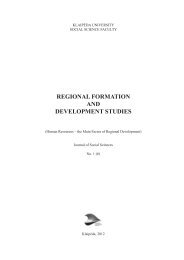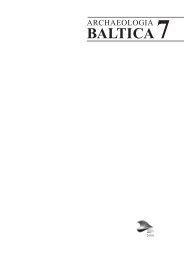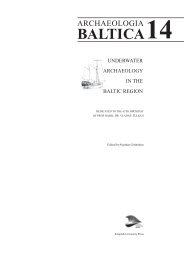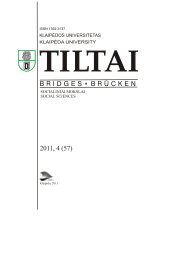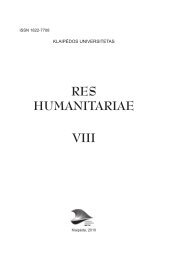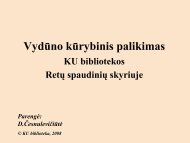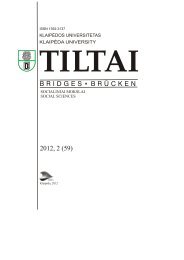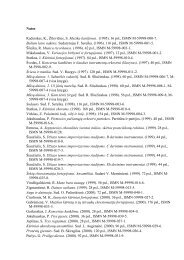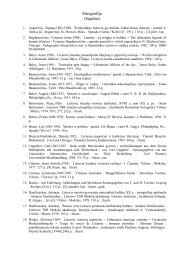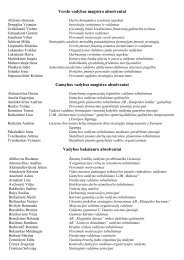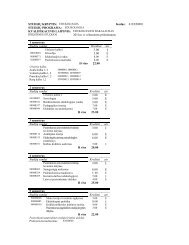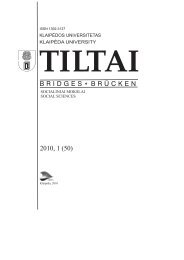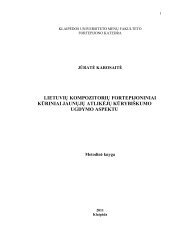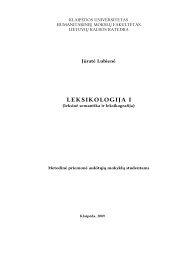ANDRAGOGIKOS MOKSLO ŽURNALAS Nr. 2 - KlaipÄdos ...
ANDRAGOGIKOS MOKSLO ŽURNALAS Nr. 2 - KlaipÄdos ...
ANDRAGOGIKOS MOKSLO ŽURNALAS Nr. 2 - KlaipÄdos ...
Create successful ePaper yourself
Turn your PDF publications into a flip-book with our unique Google optimized e-Paper software.
eflection, mutual understanding and mutual help. Different roles require different<br />
performance competencies, however they are not constant, so the lecturer shall follow ones<br />
competences level and master them. The study results revealed that it is more actual for<br />
younger age students that the lecturer has mastered the organization of adult learning, with<br />
respect to group heterogeneity, size, the selection of interesting and effective methods,<br />
didactic, consultancy competences, and the elder age learners prefer the lecturer‘s<br />
communication, assistance competences. The study of scientific literature and the research<br />
data analysis made it possible to accentuate the main andragogues realization activity<br />
peculiarities from the aspect of didactics: knowledge of adult learners needs, aims,<br />
psychological characteristics; studentens experience and subject(s) based implementation of<br />
didactic strategies; development of personal, social, didactic competences; continuous<br />
improvement and refreshment; activation of students‘ critical thinking; management of<br />
heterogeneity; aspirations together with an adult learner of mutual help, understanding and<br />
cooperation. For the increase of efficiency and improvement of andragogues activities from<br />
didactic aspect, the following is recommended for University lecturers: 1) pay attention not<br />
only to professional training, but also to the regular education, the expansion of adult learners<br />
psychology and cognitive needs, create a set of andragogical didactic methods, which would<br />
allow to model them flexibilly, to vary, while responding to students' expectations, improving<br />
the quality of training and the teaching process; 2) assess and respond to the adult lecturer<br />
personal requirements for social development, in the context of the learners expectations, try<br />
to develop tolerance, responsibility, empathy and flexibility to develop a friendly cooperative<br />
atmosphere and supportive learning environment; 3) continuously self educate and foster<br />
professional ethics, conceptual thinking skills, ability to see the reality change, discern the<br />
trends, evaluate them, link training content to learners' goals, recognizing the significant<br />
importance of the didactic methods that encourage the students critical thinking and reflexive<br />
activity; 4) critically assess own competence and professionalism, and focus on areas for<br />
improvement; 5) develop not only theoretical or practical, but also social students<br />
competences and encourage their evolution, which shall express in new forms of<br />
communication and cooperation in connection with new thinking and human relations<br />
techniques; 6) given to adult personality, heterogeneity, learning needs and situation, select<br />
and apply optimal andragogical interaction tools and techniques to stimulate the activity of<br />
learning, motivation, self-learning. Increase of the learnng process efficiency and facilitating<br />
the activities of didactic teaching, university students are encouraged to: actively, working<br />
together with teachers, participate in the learning process of organizing, developing,<br />
explicating their goals, expectations, needs, support selection of didactic methods, tools,<br />
techniques and so on.<br />
KEY WORDS: andragogue lecturer, realization activity field, didactics, peculiarities.<br />
18


